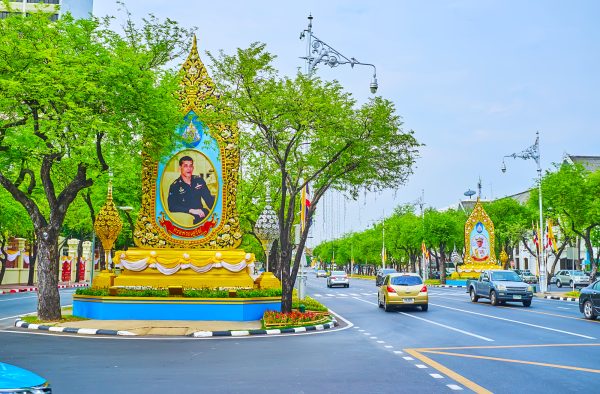
A court in Thailand yesterday acquitted five pro-democracy demonstrators of threatening the queen by blocking her motorcade during a political protest in 2020, a rare sign of moderation in a legal case involving the Thai monarchy.
In its ruling, the judges citing a lack of evidence that the protesters were aware of the incoming royal convoy, and blamed police for failing to prepare for its proper passage.
The charges referred to an incident on October 14, 2020, in which a motorcade carrying Queen Suthida attempted to drive through a crowd close to a large demonstration in Bangkok – one of a wave of large protests that took place in the second half of that year and early in 2021.
Dozens of protesters appeared to block the vehicle while holding aloft the three-fingered salute from “The Hunger Games” movie, which has been adopted as a sort of regional symbol of democratic resistance. (It would later see widespread use in Myanmar after the military coup of February 2021.)
The youth-dominated demonstrations of 2020 and 2021 involved calls for the resignation of Prime Minister Prayut Chan-o-cha, the passage of a genuinely democratic constitution, and – most controversially – calls for reforms to the unaccountable power of the monarchy.
The five activists were subsequently charged under Article 110 of the Thai criminal code, an archaic law that shields royals from being threatened or physically harmed. If found guilty, they would have faced a minimum sentence of 16 years in prison, though the charge also can result in life in prison – or even the death penalty.
According to a report by BenarNews, the court found insufficient evidence the five defendants planned to harm or impede the royal procession. It said that protesters had not been informed by police that the motorcade was in the area, nor did the group have access to confidential information that might have alerted them to its route.
In an interview with CNN following the verdict, Bunkueanun Paothong, one of the defendants, said that the ruling had come as a relief. “There was enormous tension in the room as we waited for the presiding judge to finish his verdict,” he said. “But as soon as he reached his conclusion we all felt relieved that our beliefs and determination have been vindicated.”
The verdict was a rare sign of reason and moderation in a charge involving the Thai monarchy, an institution that is treated as effectively beyond political contestation of debate. While Article 110 is rarely used – indeed, this case was the first of its kind in modern Thai history, according to Thai Lawyers for Human Rights, which represented the defendants – there are currently more than 200 ongoing cases involving Article 112, commonly known as the lese-majeste law, an elastic provision that outlaws critical comments of the monarchy or the king. Many of these have involved the organizers and participants in the protests of 2020-2021, and some have involved the most innocuous “offenses,” such as the placing of a sticker on a portrait of King Vajiralongkorn or social media posts deemed critical of the monarchy.
The abuse of the lese-majeste law to silence dissent has resulted in louder calls for the amendment of abolition of Article 112. The former was among the campaign promises of the progressive Move Forward Party, which won a plurality of votes at last month’s general election.
Thai Court Acquits Protesters of Threatening Queen’s Motorcade
Source: Frappler

0 Comments